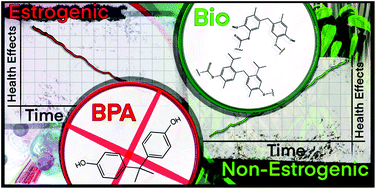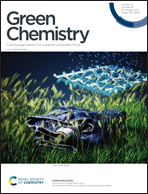BPA-free high-performance sustainable polycarbonates derived from non-estrogenic bio-based phenols†
Abstract
Bisphenol A (BPA) is a versatile petrochemical used in the preparation of high volume polymers including polycarbonates and epoxy resins. Unfortunately, BPA is also an endocrine disrupter and has been banned from use in various consumer products by several regulatory agencies. To address this issue, our group evaluated the estrogenic activity of nine bio-based tris/bisphenols derived from resveratrol (1 and 2), anethole (3, 4), eugenol (5), carvacrol (6), and creosol (7–9). Compounds 5–9 were determined to be non-estrogenic, while compound 3 exhibited a response at a lower concentration than BPA, and compounds 1, 2, and 4 exhibited responses similar to BPA. Polycarbonates of the bio-based bisphenols (PC3–PC9) were then synthesized via interfacial polymerization and characterized by SEC, MALDI-MS, DSC, TGA, and UV-VIS spectroscopy. The bio-based polycarbonates exhibited Mn values up to 14 600 Da (SEC) and had a wide range of glass transition temperatures (Tg) with values up to 156 °C (∼25 °C higher than BPA with a similar molecular weight) depending on the monomer structure. The bio-based polycarbonates had high thermal stabilities with Td5% values up to 383 °C under a nitrogen atmosphere. The non-estrogenic properties of 5–9 coupled with the good thermal properties of the derivative polycarbonates suggests that these materials are sustainable, lower toxicity alternatives for BPA-based polycarbonates.



 Please wait while we load your content...
Please wait while we load your content...